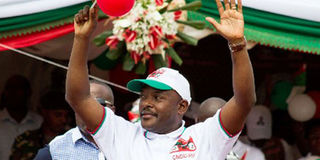Burundi needs a ‘Garden City Shopping Mall’

Burundi President Pierre Nkurunziza acknowledges the crowd as he arrives to give a speech during the official start of the 2015 electoral campaign in Bujumbura, on June 26, 2015. It is Mr Nkurunziza’s view of life and personal interest against those of the world around him. PHOTO | AFP
What you need to know:
- It will be remembered that the 1993-2005 civil war cost the lives of an estimated 300,000 people and only seemed to end with a peace process that brought in a new constitution in 2005.
- Now with the battles and the killing in the suburbs of Bujumbura, the economic case could only be dire, with thousands of livelihoods affected.
- Let the outside world also throw some money into Burundi to improve government service delivery.
As Burundi continues to teeter on the brink of an all-out civil war, with its leaders grandstanding with the African Union (AU) on the merits of a peacekeeping force and President Nkurunziza saying he would consider such a force an invading army, it must not be lost on us that it is the citizens of this small country that has not known real lasting peace since the 1990s, that are suffering.
Meanwhile, as the AU digests Burundi’s official reaction, the caption on a Tupac (the singer)– emblazoned shirt “Me against the world’’ that Mr Nkurunziza, then an ordinary young man, wore in the 1990s seems to have come ominously true.
It is Mr Nkurunziza’s view of life and personal interest against those of the world around him.
Burundi, a country of 11 million people must not be allowed to slide back into another civil war.
It will be remembered that the 1993-2005 civil war cost the lives of an estimated 300,000 people and only seemed to end with a peace process that brought in a new constitution in 2005, which promised fair representation of both Hutus and Tutsis.
Mr Nkurunziza, a Hutu became President, promising to serve for only two terms. He just broke that promise, the reason for the current turmoil.
The dire nature of the country is felt the minute you land at the airport. Until a few years ago, you would land and yours would be the only commercial plane on the tarmac.
A visit to the Heroes Cemetery in the Capital reveals a country that has had its fair share of presidents in its 50-year history.
But clearly, they left the job half-done throughout their tenures.
ECONOMIC EFFECTS
Burundians are generally a peaceful, but active people and a visit to the famous market that burned down a few years ago, brought you face to face with a teeming army of young and old Burundians struggling in the hustle, selling all manner of wares, striving to make a living.
Now with the battles and the killing in the suburbs of Bujumbura, the economic case could only be dire, with thousands of livelihoods affected.
Burundi has been part of the regional bloc — the East African Community — since 2008 when, together with Rwanda, it was admitted into the then EAC Customs Union.
But while the people of these countries are similar, their current fortunes could not be more different.
Burundi continued on a business as usual, laissez-faire approach. Rwanda’s approach has paid off in a big way.
Perhaps combined with the absence of a proactive media and scant news except when there has been ‘rebel gunfire news’ coming out of Bujumbura, the country has not been able to attract the necessary investor confidence and money to drive jobs and input tax revenues into government coffers for required services.
Meanwhile the President just seemed contented with the title. Would a strategic marketing blitz have helped the country? We can only speculate.
CAREFREE
Is it any wonder then that even as young men have been pulled out of their houses and killed, this did not meet with the commensurate swift anger and demand from across the region to stop the killings?
Could this be a pointer to the general view that “there isn’t ‘much to lose in Burundi?” Put another way, would Burundi be suffering this attention lethargy if there were significant business investment by outsiders in its economy — manufacturing, finance and service on the level of say Bidco, Garden City Mall, Westgate Mall (to use Kenyan examples) in the Bujumbura suburbs?
Perhaps if and when calm returns to Bujumbura, we may need to start by helping our fellow regional citizens build a “Garden City Mall” of their own.
Let the outside world also throw some money into Burundi to improve government service delivery.
Mr Kiraka is a consultant, Regional Agricultural Trade Policy, Comesa. [email protected]




